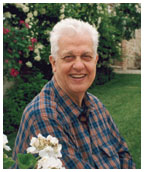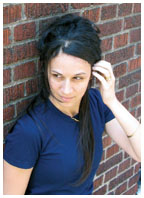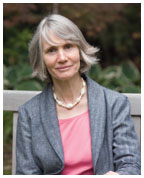November 8, 2006: Books and Arts
Articulating Spinoza
Rebecca Goldstein *77 examines the life and beliefs of a renegade Jew
Literary awards for criticism, fiction, and history
Appreciative audiences
Michelle Hensley ’80 brings Shakespeare to inmates and homeless
people
For a complete list of books received, click here.
Articulating
Spinoza
Rebecca Goldstein *77 examines the life and beliefs of a renegade
Jew
By Iris Blasi ’03
A novelist and philosopher, Rebecca Goldstein *77 uses techniques from fiction in her biography of Spinoza. (Steven Pinker) |
Rebecca Goldstein *77 first learned about Baruch Spinoza as a teenager in an Orthodox Jewish school on Manhattan’s Lower East Side. A 23-year-old philosopher excommunicated from his Jewish community in Amster-dam in 1656, Spinoza scandalized his contemporaries by “insisting on secularism when the concept of it had not yet been conceived,” says Goldstein.
Spinoza was taught to Goldstein as a cautionary tale — the story of what can go wrong when one asks the wrong sorts of questions. To the young Goldstein, who was struggling with a faith that didn’t quite fit her, the questions Spinoza posed in his doubting of religious authority seemed like just the ones to be asking.
 Published
by Schocken in May, Betraying Spinoza: The Renegade Jew Who Gave Us
Modernity looks at the philosopher’s life and beliefs and is the product of
Goldstein’s lifelong habit of questioning — a habit that originally
brought her to philosophy, and to Princeton to earn her doctorate. Goldstein
reveled in the discipline until her father died and her first child was
born. At the time she was an assistant professor at Barnard College. Confronting
grief and parenting simultaneously, she thought, “I’ve gotten
a doctorate from the best philosophy program in the world, but am I any
better off than the next 26-year-old?” She turned to writing fiction
as a way of unraveling her complex feelings.
Published
by Schocken in May, Betraying Spinoza: The Renegade Jew Who Gave Us
Modernity looks at the philosopher’s life and beliefs and is the product of
Goldstein’s lifelong habit of questioning — a habit that originally
brought her to philosophy, and to Princeton to earn her doctorate. Goldstein
reveled in the discipline until her father died and her first child was
born. At the time she was an assistant professor at Barnard College. Confronting
grief and parenting simultaneously, she thought, “I’ve gotten
a doctorate from the best philosophy program in the world, but am I any
better off than the next 26-year-old?” She turned to writing fiction
as a way of unraveling her complex feelings.
Balancing her burgeoning writing career with her teaching load, Goldstein has published six novels. When queried by Schocken Books about a potential project, she immediately pinpointed Spinoza.
Betraying Spinoza is Goldstein’s attempt to make the notoriously dense philosopher accessible. Spinoza believed that salvation came not through adherence to religion but by the use of reason, and that only with absolute objectivity could one achieve liberation, explains Goldstein. This secularism was horrifying to his Jewish peers, most of whom were descendants of Jews who had fled the Spanish-Portuguese Inquisition, sacrificing their homes to safeguard their lives and religion. Yet, Goldstein argues, Spinoza was merely urging people “to remember that we have no control over anything other than the progress of our own understanding.”
Ultimately, both Spinoza and Goldstein rebelled against their strict religious upbringings, and both went on to make significant contributions to their respective fields. Spinoza later created one of the most impressive systems of Western philosophy. Goldstein, now a fellow at the Radcliffe Institute for Advanced Study at Harvard, won a 1996 MacArthur Fellowship, known as a “genius grant,” for her work combining literature and philosophy.
Goldstein’s experience as a novelist is evident in Betraying
Spinoza,
which includes a fictional section in which Goldstein re-creates the lecture
that was actually delivered to her high school class in her Orthodox Jewish
school. What would Goldstein say to that teacher today? “I would
tell her that she got Spinoza wrong,” Goldstein says. “But
I would thank her for having told us this story. It had a huge effect
on me.” ![]()
Iris Blasi ’03 is a freelance writer in New York City.
For a complete list of books received, click here.
 The Concord Quartet: Alcott, Emerson, Hawthorne, Thoreau, and the Friendship
That Freed the American Mind — Samuel A. Schreiner Jr.
’42 (John Wiley). The author writes about four friends living in
Concord, Mass., in the mid-19th century: Ralph Waldo Emerson, Henry David
Thoreau, Nathaniel Hawthorne, and educator Amos Bronson Alcott (the father
of Louisa May). Schreiner looks at how these men shaped American thought
and details their everyday lives. Schreiner is a former senior editor
at Reader’s Digest.
The Concord Quartet: Alcott, Emerson, Hawthorne, Thoreau, and the Friendship
That Freed the American Mind — Samuel A. Schreiner Jr.
’42 (John Wiley). The author writes about four friends living in
Concord, Mass., in the mid-19th century: Ralph Waldo Emerson, Henry David
Thoreau, Nathaniel Hawthorne, and educator Amos Bronson Alcott (the father
of Louisa May). Schreiner looks at how these men shaped American thought
and details their everyday lives. Schreiner is a former senior editor
at Reader’s Digest.
 Untapped: Creating Value in Underserved Markets — Michele
Kahane ’81 et al. (Berrett-Koehler). This book examines how companies
can make a difference in low-income communities and at the same time achieve
positive financial results. The authors use case studies to demonstrate
how corporations are using new business strategies to provide underserved
communities with needed goods and services, jobs, and opportunities for
entrepreneurship. Kahane is director of special projects for the Center
for Corporate Citizenship at Boston College.
Untapped: Creating Value in Underserved Markets — Michele
Kahane ’81 et al. (Berrett-Koehler). This book examines how companies
can make a difference in low-income communities and at the same time achieve
positive financial results. The authors use case studies to demonstrate
how corporations are using new business strategies to provide underserved
communities with needed goods and services, jobs, and opportunities for
entrepreneurship. Kahane is director of special projects for the Center
for Corporate Citizenship at Boston College.
 The Sweet Life: Desserts from Chanterelle — Kate Zuckerman
’93 (Bulfinch). In this cookbook, the author — the pastry
chef at Chanterelle in New York City — offers recipes for her creations,
from tarts, cakes, and cookies to soufflés and frozen confections.
She also includes tips on various techniques, such as baking a French
meringue, and histories of key ingredients, such as dates and vanilla
beans. Her desserts have been described as a “life-changing experience”
by The New York Times.
The Sweet Life: Desserts from Chanterelle — Kate Zuckerman
’93 (Bulfinch). In this cookbook, the author — the pastry
chef at Chanterelle in New York City — offers recipes for her creations,
from tarts, cakes, and cookies to soufflés and frozen confections.
She also includes tips on various techniques, such as baking a French
meringue, and histories of key ingredients, such as dates and vanilla
beans. Her desserts have been described as a “life-changing experience”
by The New York Times.
By K.F.G.
For a complete list of books received, click here.
Pietro Frassica
Rivka Galchen ’98
Rebecca J. Scott *82 (Photos courtesy Pietro Frassica, Rivka Galchen ’98, Lin Jones) |
Literary awards for criticism, fiction, and history
Princeton professor Pietro Frassica, a specialist in Italian literature, was awarded the “Premio Val Comino” prize for his book, Varianti e invarianti dell’evocazione (Variants and Invariants in Evoked Themes), on Oct. 1 in Alvito, Italy. The book, published by Giardini Editori in Pisa, Italy, analyzes several 20th-century Italian authors.
On Sept. 14 in New York City, Rivka Galchen ’98 was one of six recipients of the 2006 Rona Jaffe Foundation Writers’ Awards, given annually to women writers who demonstrate promise in the early stages of their careers. Galchen, who recently earned an M.F.A. from Columbia and in 2003 earned an M.D. from Mount Sinai School of Medicine, is working on her first novel, Open Letter to the Royal Academy of Meteorology, about a 51-year-old psychiatrist who believes that his wife has been replaced with an exact look-alike.
Rebecca J. Scott *82, a professor of history and law at the University of Michigan, has won the 2006 Frederick Douglass Book Prize for the best book on slavery or abolition, for Degrees of Freedom: Louisiana and Cuba After Slavery, published by Harvard University Press in 2005. Her book examines two slave societies and their paths to freedom. The prize will be presented to Scott in February in New York City.
Appreciative
audiences
Michelle Hensley ’80 brings Shakespeare to inmates and
homeless people
By Sheila Mulrooney Eldred
Director Michelle Hensley ’80 (courtesy Michelle Hensley '80) |
The seventh Shakespeare production directed by Michelle Hensley ’80 recently opened to packed houses in the Twin Cities.
Those in the audience are not, however, typical theatergoers: They are prison inmates and homeless men and women living in shelters in Minneapolis and St. Paul. The show, The Merchant of Venice, opened Oct. 19 and is running through Nov. 19. Hensley anticipated that the play’s theme of justice would resonate with these audiences. “These aren’t abstract issues for them,” she says.
Hensley’s theater company, Ten Thousand Things, performs in spare conditions: no elaborate sets, no dim lights, no plush seating. The set for The Merchant of Venice, for example, consists of a ring of raw wood or metal, a couple of circular windows and three caskets. On top of each casket are metal rods and sheet-metal sails.
But the audiences are more engaged than those you find in typical venues, says Hensley. The audience sits in a circle of folding chairs; the actors perform inside the circle. “Audience members are often six to 12 inches away from the actors,” she says. “It is direct; it is immediate.”
Hensley founded her theater com-pany in Los Angeles 15 years ago while searching for audiences that had never seen theater before. Hensley, who was living in Los Angeles at the time, found such a group in a Santa Monica homeless shelter. Since then she has brought productions such as Ragtime and Waiting for Godot to prisons, shelters, and rehabilitation centers.
Her company, which moved to Minneapolis in 1993, also performs for mainstream audiences.
Ten Thousand Things has been recognized for the quality of its work. “If somebody wishes to compile a list of the Twin Cities’ finest actors, they’ll need do no more than take a look at Hensley’s programs,” wrote the theater critic for the Twin Cities’ alternative weekly City Pages. In 2005, Hensley won the Francesca Primus prize for outstanding work by a pioneering woman in theater, becoming the first director to win the award from the American Theater Critics Association.
An English major at Princeton, Hensley took an acting class her senior year. When her acting professor suggested she try directing, she realized it was a perfect fit. “I love seeing the big picture,” she says.
Performing for prison inmates adds a different dimension to the actors’ experience, says Hensley. “When you’re performing King Lear at a maximum-security prison for people who have killed other people, you’d better know what you’re talking about,” she says.
Hensley brags that the Twin Cities have the most theater-literate prison
population in the country. She says she has overheard conversations of
inmates such as, “Well, I liked Ibsen. I didn’t really like
Beckett, but Carousel was my favorite.” ![]()
By Sheila Mulrooney Eldred
Sheila Mulrooney Eldred is a freelance writer in Minneapolis.




